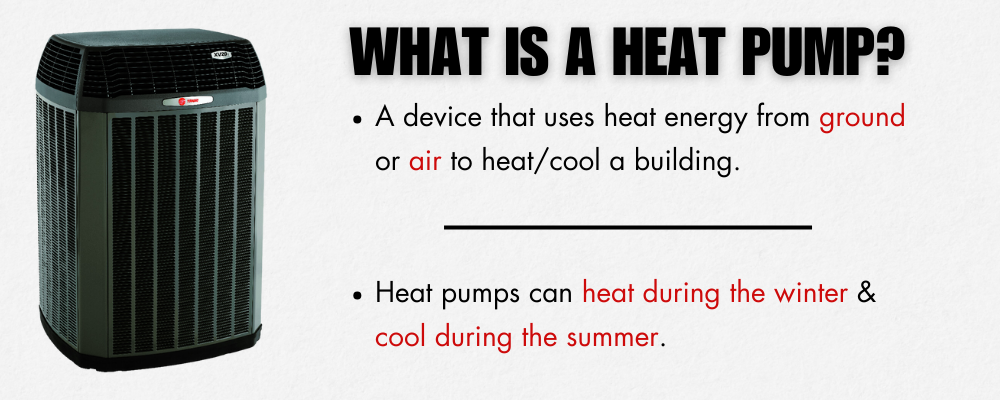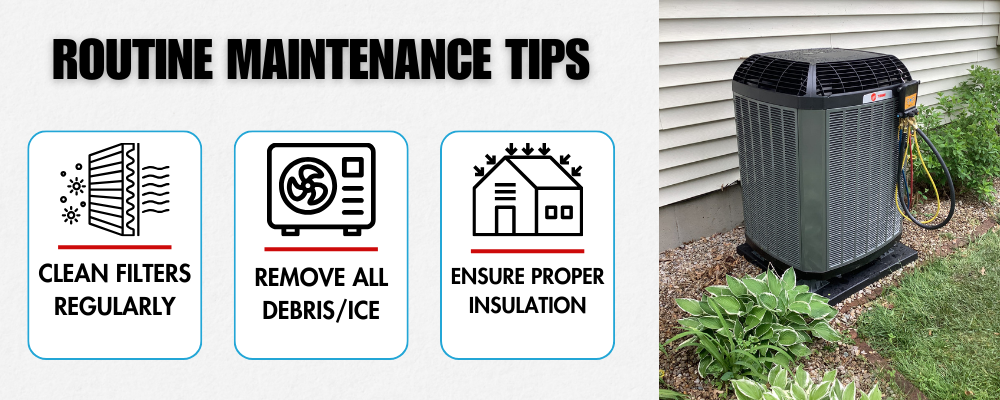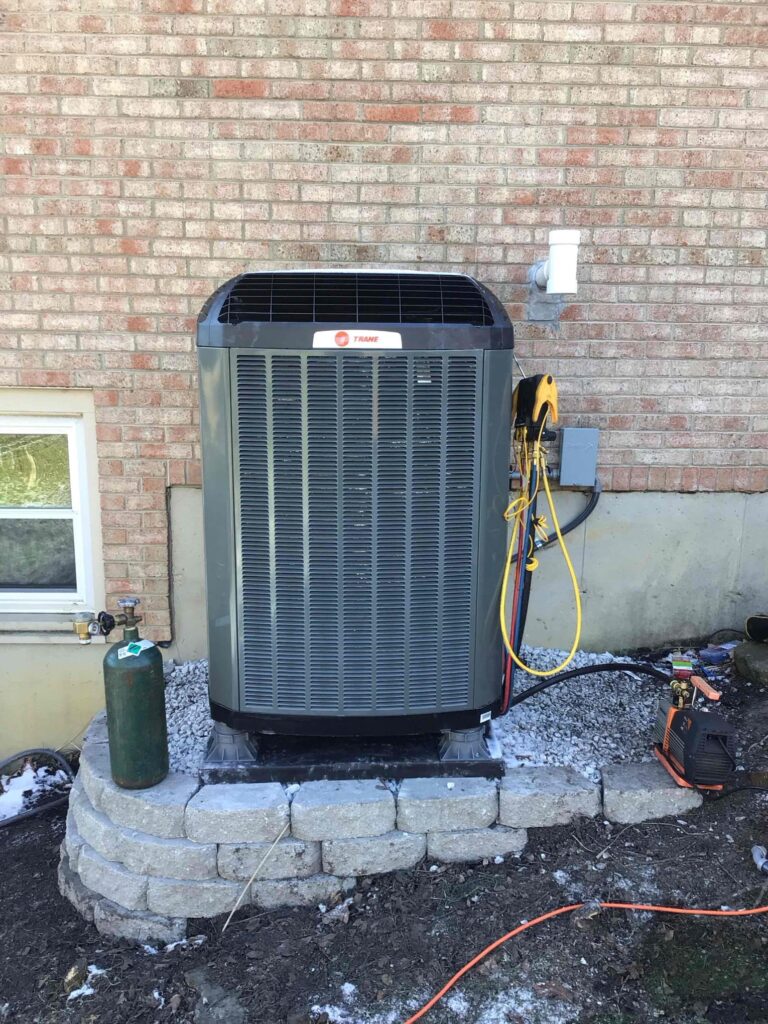Heat pumps are an integral component of any modern heating system, especially in harsh winter conditions, but do we fully understand how they work? Let’s explore the functionality of heat pumps, from their efficiency in cold weather to routine maintenance tips.
What is a Heat Pump?
A heat pump is a climate control device that utilizes heat energy from a source such as the ground or air to heat or cool a building. It absorbs heat energy during the heating cycle from a source and transports it to a sink (like your home). In contrast, an air conditioner only cools spaces by transferring heat away. A heat pump can reverse this process to provide heating during the winter and cooling in the summer.

A Brief History of Heat Pumps
The first heat pump technology emerged in the early 19th century but became a standard household heating option in the 1970s. They provided an energy-efficient alternative to resistance heating and natural gas furnaces, which consume more energy.
Types of Heat Pumps
There are different types of heat pumps, including air-source heat pumps, ground-source heat pumps, and gas-absorption heat pumps. An air-source heat pump absorbs heat from the air, while a ground-source heat pump (also known as a geothermal heat pump) absorbs it from the ground. These heat pumps work great in varying weather conditions.
How Heat Pumps Operate in Winter
Have you ever wondered “How does heat pump work in winter?” These pumps use refrigeration technology to extract heat from the air outside or ground, enhance its temperature through a compressor, and distribute the warmth to your home. In mild climates, an air-source heat pump can be a good alternative to conventional heating systems that use more energy.
The Science Behind Heat Pumps in Winter
Under the principles of thermodynamics, even in cold weather, there is still some heat in the outside air. The refrigerant in the pump’s evaporator coil absorbs the low-temperature heat energy and transforms into a high-temperature heat source that warms your house. In frigid climates, heat pumps may require a supplemental heating source.
The Role of Refrigerants
Refrigerants play a crucial role in the defrost cycle of a heat pump. Through a phase conversion process, they absorb heat at a low temperature and pressure, then release it at a higher temperature and pressure, and the cycle continues.
Heat Pumps and The Reversing Valve
A crucial component, the reversing valve, allows the heat pump to act as a heater in the winter and an air conditioner in the summer. Unlike resistance heating, this makes heat pumps a year-round climate control solution.
The Efficiency of Heat Pumps in Cold Weather
Heat pumps can be a more energy-efficient choice than traditional heating methods like gas furnaces and boilers. In temperatures above 25-30 degrees Fahrenheit, an air-source heat pump is probably more efficient due to the higher upfront cost of ground-source heat pumps, which can deliver more heat at temperatures below freezing.
Limitations of Heat Pumps in Extremely Cold Weather
It’s important to note that heat pump efficiency can diminish in extremely cold weather, often making a gas furnace a more cost-effective option. For this reason, heat pumps are typically used as a supplemental heat source instead of the primary heating system in colder climates.
Strategies for Maximizing Heat Pump Efficiency in Winter
Proper insulation and air sealing of your home are vital to maximize heat pump efficiency. Regular maintenance to keep the defrost cycle functioning properly and enlisting a professional check-up twice a year (ideally before the heating and cooling seasons begin) is also recommended.
Supplemental Heating Sources
As mentioned, in extremely cold climates, a supplemental heat source may be necessary. This could be a gas furnace or boiler, a wood-burning stove, or electrical resistance heaters. A dual-fuel system combining a heat pump with a natural gas furnace can offer a cost-effective solution.
How to Properly Maintain Your Heat Pump in Winter
Just like your car needs regular maintenance for efficient functioning, heat pumps also require a regular maintenance schedule. Let’s review routine maintenance tips to ensure the utmost efficiency of your heating system.
Routine Maintenance Tips

- Clean the filters of your heat pump regularly. Dirty filters can restrict the airflow, causing the system to work harder, eventually leading to higher energy consumption.
- Ensure the heat pump’s outdoor unit is not blocked by debris or ice. During winter, it is crucial to clear snow around the unit for efficient performance.
- Covering basics, like proper air sealing and insulation, also contributes to the efficient functioning of an air source heat pump and helps reduce unnecessary load.
Remember, a well-maintained heat pump can do a great job when the weather gets cold.
Understanding Defrost Cycles
The defrost cycle is crucial to how heat pumps work in winter. When the temperature falls below freezing, your heat pump’s outdoor coil may accumulate frost, hindering the ability to absorb heat.
During a defrost cycle, the heat pump briefly shifts operations to act like an air conditioner, melting accumulated frost. After the defrost cycle concludes, the heat pump resumes heating mode. If you feel your heat pump’s defrost cycle isn’t working properly, call for professional assistance.
Professional Services and Scheduled Inspections
Whether you have an air source or ground source heat pump, getting professional maintenance at least once a year is highly recommended. Scheduling a professional service will keep your pump running efficiently and prevent unexpected breakdowns that leave your home cold.
Professional service includes a thorough inspection of the equipment, performance tests, and necessary adjustments. With Logan Services, you can easily and quickly schedule an appointment with one of our qualified technicians.
Look to Logan Services A/C, Heat & Plumbing for HVAC Maintenance
If you need a professional to perform heat pump maintenance or you need help with another HVAC issue, Logan Services is here to help. We are a family-owned and operated business proudly serving Ohio residents with outstanding HVAC services. Logan’s HVAC technicians and installers undergo intensive training to bring you quality workmanship and are committed to answering your questions and clearly communicating throughout the process. If you need to purchase a new AC unit, our install managers have years of experience offering comprehensive support throughout the process.
We are proud to be part of the community offering outstanding HVAC services. Contact us today to get started.

Frequently Asked Questions about Heat Pumps in Winter
Are heat pumps effective in winter?
Yes, heat pumps are designed to function effectively in cold weather. Your heat pump system can perform consistently in cold months with routine maintenance.
What temperature is too cold for a heat pump?
The temperature limit varies for each heat pump model; usually, around -20 degrees Celsius is too cold for standard air source heat pumps. Ground source heat pumps, on the other hand, can work effectively even in much colder temperatures.
How can I increase my heat pump’s efficiency?
Efficient operation of your heat pump involves regular maintenance such as cleaning filters, regular inspection, and removing any debris around the unit. Optimal heat pump work also depends on air sealing and insulation of your home.




















